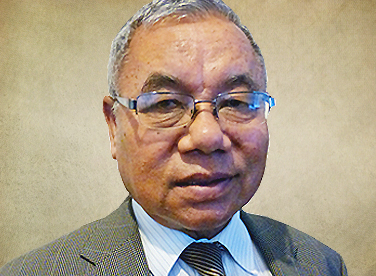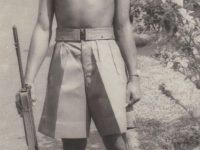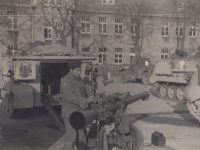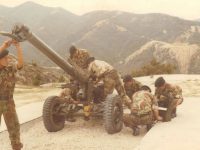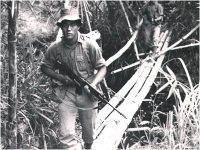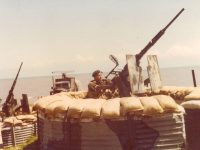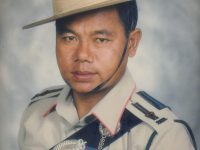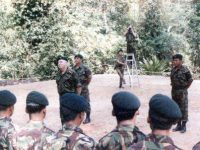Major (Ret’d) Deb Bahadur Pun
-
Recruit Training, 1961, Sungei-Patani, Malaysia
-
Anti-tank training, Germany 1969
-
Training, Hong Kong, 1981
-
Jungle patrol
-
Anti-aircraft operation, Belize, 1981
-
Major Deb Bahadur Pun, 1987
-
Audio 1
-
Audio 2
Deb Bahadur Pun reached the rank of Major (Queen’s Gurkha Officer) which is the highest rank a Gurkha soldier can attain.
Throughout his twenty eight year career in the army Deb Bahadur Pun served in Malaya, Singapore, Brunei, Hong Kong, Australia, Fiji, UK, Germany and Belize. His roles of responsibility progressed from rifleman to section commander, platoon commander then the rank and role of Gurkha major. He was posted to the anti tank platoon in Germany (Green Jackets),trained as an army physical training instructor and lead the demonstration of platoon command at Brecon, UK (demonstration of military tactics, weapons and warfare for new army recruits).
Deb was a competitive basketball player in the army winning several Far East area competitions for his battalion when he was in Singapore.
As a brand new recruit, in 1962, Deb’s D Company was flown into Brunei for what was to become the first night of the Brunei Rebellion and an ambush on the night of 8th December. On retirement Deb and his family tried to establish their own business in Nepal but the political landscape of the 1990s made it difficult and he came under pressure from the Maoists to pay them extortion fees. He moved his family to Hong Kong where he worked as a security guard for a short while until it was more settled in Nepal. Deb’s audio clips are accompanied by their transcript below.
(More veteran stories are in our book, published later this year. Keep posted via our blog: www.gurkhastories.wordpress.com)
Audio 1 (1 min 30 secs):
They sent us, small group, to cross the Indonesian border by helicopter. There were four SAS British soldiers there and they ask us to protect them, then we went with them. Then we stayed there with them for about a month, the other side of the border and we carried a little bit of ration and then we work with them and what they do we are just keeping protection and we are carrying some explosive for them and they are doing booby-trapping. All the way other side of the Indonesia.
Then we stay in the night, until the dark, get dark, they didn’t speak or anything, just they stay down, don’t make anything, then after night they start lighting, then reading book, then talking you know while it gets dark, then we are frightened, you know, “Why you are doing this?” Because the SAS people what they say is, “It’s night nobody comes here [laughs]. I’m not going–, nobody is going to come here so why not?” Then they stay in light and reading and, and when, before five o’clock, they close down everything. All silent, all has gone.
Audio 2 (2 mins 12 secs)
[Did you consider your choices after retirement from army?]
Yes, after that I went to the Nepal, I had a very difficult time, what I means we don’t know about Nepal. All the time was spent in the army. Then I tried to give good education to my children, then I stay in Kathmandu, I buy my own home, then I give them a good education. I was settled down and everything then they started the Maoist in Nepal. The first time is slow, okay, the Maoist is started let’s see, and later on they come to us, “You are now British army major you know everything, you have to teach us how to–, you know that’s a lot of thing they are asking us. Then I says, “Okay, okay.” We have to say okay otherwise they will kill us. Then, “Okay, I will help you.” Then they ask money and I give them money, then they said I should go with them but, “I’m not going I’m just helping you.” Then other side the Nepal army they says, “Look, you are major, British army major, you know everything,” they says. They are coming to me again. The other side has gone to the Maoists and this side has come to the Nepal army, which way I go? They really give us very hard time by Maoists, that side are Maoist this side is the army which way I had to go?
If I not go–, not help with the Maoists they will kill me, and the army says, “You are going to the Maoists, are you really if not then they’ll grab the army.” I had a very difficult time.
Then I went to Hong Kong for two years, safer yes. Then later on my wife also take the Hong Kong.
Oral histories: © Gurkha Voices Oral History Project

